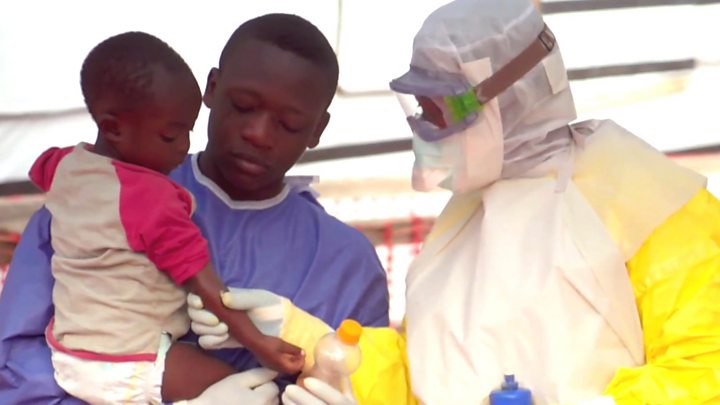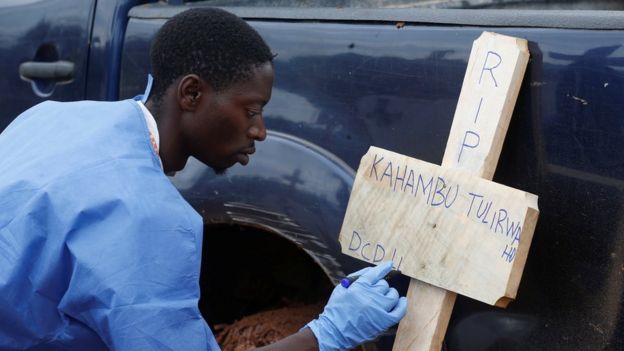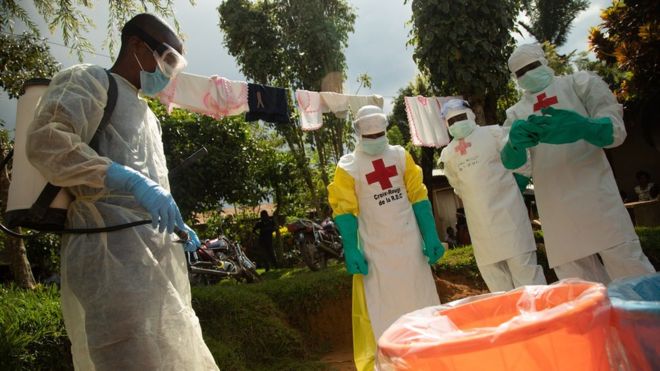The head of a major medical research charity has called the latest outbreak of Ebola in central Africa “truly frightening”.
Nearly 1,400 people have died in the Democratic Republic of Congo.
Dr Jeremy Farrar, the director of the Wellcome Trust, said the epidemic was the worst since that of 2013-16 and has showed “no sign of stopping”.
Two people have also died in neighbouring Uganda, the first cases of Ebola reported in the country.
A five-year-old boy infected with the virus died on Tuesday and his 50-year-old grandmother died on Wednesday, the Ugandan health ministry said.
The Ugandan government has reported at least six other suspected cases of the virus.
In a statement, Dr Farrar said the spread was “tragic but unfortunately not surprising”. He warned that more cases were expected, and a “full” national and international response would be needed to protect lives.
“The DRC should not have to face this alone,” he said.

What’s the situation so far?
Since the first case of Ebola in DR Congo last August, nearly 1,400 people have died – around 70% of all those infected.
The outbreak is the second-largest in the history of the disease, with a significant spike in new cases in recent weeks.
Only once before has an outbreak continued to grow more than eight months after it began – that was the epidemic in West Africa between 2013-16, which killed 11,310 people.
- Ebola disbelief widespread in Congo hotspots
- Why Ebola keeps coming back
Efforts to contain the spread have been hindered by militia group violence and by suspicion towards foreign medical assistance.
Nearly 200 health facilities have been attacked in DR Congo this year, forcing health workers to suspend or delay vaccinations and treatments. In February, medical charity Médecins Sans Frontières (MSF) put its activities on hold in Butembo and Katwa – two eastern cities in the outbreak’s epicentre.
In Uganda, a five-year-old boy died of the virus on Tuesday, according to the World Health Organisation (WHO).

Officials said his grandmother and younger brother also had the disease. The boy is said to have travelled across the border with his family from DR Congo on Sunday. He was then taken to a Ugandan hospital after exhibiting symptoms, including vomiting blood, officials said.
Seven other cases have been confirmed in the country, and Uganda’s government said 50 people were suspected to have come into contact with those infected.

 The Ebola outbreak in the Democratic Republic of Congo is already the second deadliest in history
The Ebola outbreak in the Democratic Republic of Congo is already the second deadliest in historyEmergency measures
Analysis by James Gallagher, Health and Science Correspondent, BBC News
Cases of Ebola appearing in another country are always a significant and worrying development. The key question now is how far has the virus spread in Uganda?
Has it been contained to just the family that crossed the border from DR Congo or has it spread more widely? This is a moment that Uganda has long prepared for and, hopefully, measures such as pre-emptively vaccinating healthcare workers will lower the risk of Ebola spreading.
This outbreak is already the second largest in human history and some have predicted it could take up to two more years to bring to an end. The WHO has twice ruled that this Ebola outbreak is not a yet global emergency. Its Emergency Committee will meet again on Friday.

What is being done to prevent the spread?
In Uganda, mass gatherings including market days and prayers have been cancelled. Market days in the town of Kasese attract an estimated 20,000 people at the border area.
Uganda’s health ministry and the WHO said a rapid response team had been dispatched to identify others at risk.
The country has already vaccinated about 4,700 health workers against the disease, according to a joint statement by WHO and Ugandan health officials.
On Wednesday, WHO head Tedros Adhanom Ghebreyesus said that he would hold an IHR Emergency Committee meeting on 14 June. The group will decide if the outbreak should now be deemed a public health emergency.

What is Ebola?
- Ebola is a virus that initially causes sudden fever, intense weakness, muscle pain and a sore throat.
- It progresses to vomiting, diarrhoea and both internal and external bleeding.
- People are infected when they have direct contact through broken skin, or the mouth and nose, with the blood, vomit, faeces or bodily fluids of someone with Ebola.
- Patients tend to die from dehydration and multiple organ failure.





